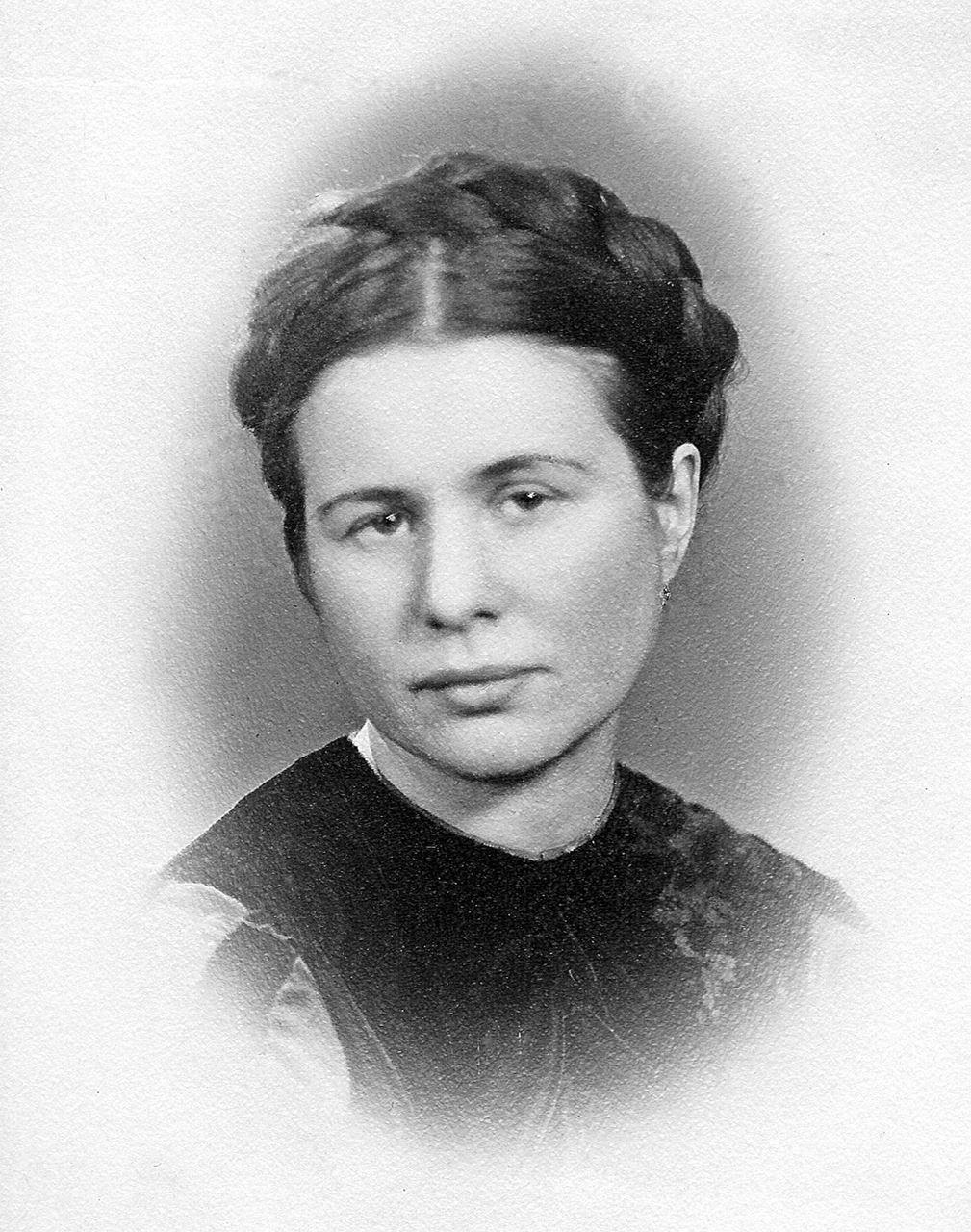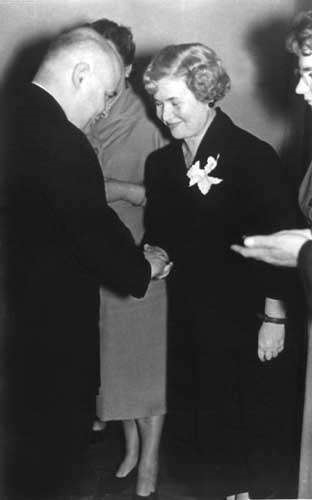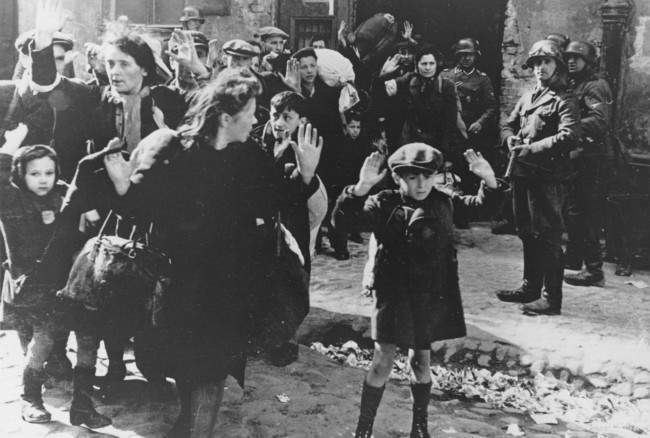A Humble Heroin; Risking Life and Limb for the Jews
“Of all creatures that breathe and move upon the earth, nothing is bred that is weaker than [humans]” (Homer, 18. 130-131). Humans are the weakest, most vulnerable, and helpless beings, according to this quote from The Odyssey. Therefore they need another person to show them the proper way to live and thrive. In the times when mankind is weak, they call upon the immortal beings they call heroes for courage and inspiration. Heroes have been around from the ancient Greeks such as Odysseus and Zeus, to modern day American superheroes like Thor, Black Widow, and Captain America. However, mythological and comic heroes are not the only heroes that exist on the planet; aside from myths, movies, and comics, there are actual real life heroes the world has to offer. Heroism is the act of doing something that takes bravery, integrity, patience, humility, selflessness, or determination. A true deserving hero is someone who sets an example for others to live by. We may find examples of real life heroes on television or in the news. Heroes like policemen bringing justice, or soldiers serving our country, keeping us safe, and fighting for freedom. There are also heroes like teachers who educate the world, and nurses who care for the sick and injured. A hero does not have to save the whole world to be considered valiant. Lastly, a hero must have good morals, and values, such as doing what is just, right, and fair. The dictionary defines a hero as “a person who is admired or idealized for courage, outstanding achievements, or noble qualities.” In my opinion, a hero should possess the traits of courage and nobleness, as well as selflessness and humility. A hero should care about helping others over helping themselves, and should be modest about their achievements rather than brag about their performance.
 Young Irena Sendlerwww.wikipedia.comAlthough many heroes accomplish things, which make them known to the world, some deserving heroes have truly changed the world; one such hero, is Irena Sendler. Her humility and integrity shines through because she does not let her success override her humbleness. Sendler, a young Catholic social worker, grew up in Otwock, Poland. After tragically losing her father at age 7, she was determined to live out his legacy of helping other people under any circumstance. Her father was a doctor that caught typhus from the patients he treated and Sendler became inspired by his choice to put others before himself. At age 29, Sendler disguised herself as a health inspector, and smuggled a large numbers of Jewish children out of the Warsaw Ghetto in Poland through secret passageways, sewage pipes, and garbage wagons. She recorded and hid the children’s identities, and buried the papers in jars until the war was over, so they could be reunited with their families. During the years of 1939 through 1943 she made a tremendous impact on the world by saving roughly 2,500 children (Miller). She escaped execution by the Nazis many times and ended up living from Feb 15, 1910 till May 12, 2008. The Gestapo captured her, and tortured her, so she would release the names of the children she saved and the people she worked with. She would not betray her fellow resistance fighters by putting them in danger and when she refused to give up their names, her arms and legs were broken. Sendler was sent to be executed and she barely managed to escape. This one of many times she was captured and narrowly avoided execution, yet she continued to rescuing Jewish children despite the risks. The Holocaust was a dark and terrifying time for the Jews and they needed nothing less than hero like Sendler to bring them hope and salvation. A hero must possess traits of humility and altruism, therefore since Irena Sendler possessed these traits, she is a hero. Her selflessness drove her to continue to help others unconditionally despite the risks and dangers she faced. Irena Sendler is a true hero due to her humility and her altruism because she always put others before herself, and did not ask to be glorified for her accomplishments.
Young Irena Sendlerwww.wikipedia.comAlthough many heroes accomplish things, which make them known to the world, some deserving heroes have truly changed the world; one such hero, is Irena Sendler. Her humility and integrity shines through because she does not let her success override her humbleness. Sendler, a young Catholic social worker, grew up in Otwock, Poland. After tragically losing her father at age 7, she was determined to live out his legacy of helping other people under any circumstance. Her father was a doctor that caught typhus from the patients he treated and Sendler became inspired by his choice to put others before himself. At age 29, Sendler disguised herself as a health inspector, and smuggled a large numbers of Jewish children out of the Warsaw Ghetto in Poland through secret passageways, sewage pipes, and garbage wagons. She recorded and hid the children’s identities, and buried the papers in jars until the war was over, so they could be reunited with their families. During the years of 1939 through 1943 she made a tremendous impact on the world by saving roughly 2,500 children (Miller). She escaped execution by the Nazis many times and ended up living from Feb 15, 1910 till May 12, 2008. The Gestapo captured her, and tortured her, so she would release the names of the children she saved and the people she worked with. She would not betray her fellow resistance fighters by putting them in danger and when she refused to give up their names, her arms and legs were broken. Sendler was sent to be executed and she barely managed to escape. This one of many times she was captured and narrowly avoided execution, yet she continued to rescuing Jewish children despite the risks. The Holocaust was a dark and terrifying time for the Jews and they needed nothing less than hero like Sendler to bring them hope and salvation. A hero must possess traits of humility and altruism, therefore since Irena Sendler possessed these traits, she is a hero. Her selflessness drove her to continue to help others unconditionally despite the risks and dangers she faced. Irena Sendler is a true hero due to her humility and her altruism because she always put others before herself, and did not ask to be glorified for her accomplishments.
 Sender being honored by Poland's Administer of Health 1958https://flashbak.comIrena Sendler is a hero because she had humility and did not glorify herself, and also because she proved that she did not need accolades in order to do the right thing. Before she died, Irena Sendler was being honored for her service by the Polish parliament where she verbalized the following statement, showing her modesty: “The term 'hero' irritates me greatly. The opposite is true. I continue to have pangs of conscience that I did so little” (Connolly). Sendler said this because she felt that she did not do enough good to be considered a hero. Her feeling of regret that she did not save more children made her humility stand out greatly. She was not boastful about all the people that she was able to save, or the amount of times that she stood up against the Nazis and escaped death. Instead she could only think of those she couldn’t help. This proves that she did the right thing not because she cared about fame or glory but because she cared for others, making her a true hero. Sendler's humility is shown again in a letter that she wrote to, Elzbieta Ficowska, one of the children she saved during the Holocaust: “Every child saved with my help is the justification of my existence on this Earth, and not a title to glory” (Vries). Sendler felt that she did not deserve a title for saving the children, and rather that she was just doing the right thing by helping them. She believed that helping others proved her worthiness to live on earth as a good person, rather than prove she should be recognized as extraordinary. Irena Sendler showed that even someone worthy of accolades and glory can stay humble, and be a true hero.
Sender being honored by Poland's Administer of Health 1958https://flashbak.comIrena Sendler is a hero because she had humility and did not glorify herself, and also because she proved that she did not need accolades in order to do the right thing. Before she died, Irena Sendler was being honored for her service by the Polish parliament where she verbalized the following statement, showing her modesty: “The term 'hero' irritates me greatly. The opposite is true. I continue to have pangs of conscience that I did so little” (Connolly). Sendler said this because she felt that she did not do enough good to be considered a hero. Her feeling of regret that she did not save more children made her humility stand out greatly. She was not boastful about all the people that she was able to save, or the amount of times that she stood up against the Nazis and escaped death. Instead she could only think of those she couldn’t help. This proves that she did the right thing not because she cared about fame or glory but because she cared for others, making her a true hero. Sendler's humility is shown again in a letter that she wrote to, Elzbieta Ficowska, one of the children she saved during the Holocaust: “Every child saved with my help is the justification of my existence on this Earth, and not a title to glory” (Vries). Sendler felt that she did not deserve a title for saving the children, and rather that she was just doing the right thing by helping them. She believed that helping others proved her worthiness to live on earth as a good person, rather than prove she should be recognized as extraordinary. Irena Sendler showed that even someone worthy of accolades and glory can stay humble, and be a true hero.
 Children in the Warsaw Ghettohttps://flashbak.com/irena-sendler-the-polish-catholic-social-workers-story-in-photos-9749/Irena Sendler is also a hero because of her selflessness and altruism when she put the Jewish children's lives before her own. The penalty for helping the Jews under the Nazi rule during World War II was execution. Despite this risk to her own life, Sendler did anything she could to save the children from the ghetto and the cruelty of the Nazis. Sendler is a hero because of her altruism, and in a interview with The Sun Newspaper she recalled something her father used to tell her and explained how it inspired her selflessness: “If you see a man drowning, you must try to save him even if you cannot swim” she added, “...all of Poland was drowning in a sea of blood, and those who were drowning the most were the Jews...So I had to give them my hand” (Miller). It is evident by her words that she believed in her heart that she must help others in the most challenging situations. Sendler showed selflessness by carrying on and saving the Jewish children, even though she knew she was in great danger. Through the act of risking her life for others, she proved her heroism. In an interview recorded by “The Guardian Newspaper” Irena was recognized for her strength, perseverance, and selflessness: “She was arrested...and taken to Gestapo headquarters where she was beaten. Her legs and feet were broken and she was then driven away to be executed...She still has to use crutches today as a result of her injuries” (Connolly). Sendler was caught and taken to be killed, and after escaping she continued to risk life and limb for the Jewish children proving that she was extremely selfless. She could have given up because she wanted to save her own life, but she instead put others above her own safety. Irena Sendler is a true hero, not only for her good-will to save others, but ultimately for her abundant selflessness that drove her to be there for the Jewish children when they needed a savior most.
Children in the Warsaw Ghettohttps://flashbak.com/irena-sendler-the-polish-catholic-social-workers-story-in-photos-9749/Irena Sendler is also a hero because of her selflessness and altruism when she put the Jewish children's lives before her own. The penalty for helping the Jews under the Nazi rule during World War II was execution. Despite this risk to her own life, Sendler did anything she could to save the children from the ghetto and the cruelty of the Nazis. Sendler is a hero because of her altruism, and in a interview with The Sun Newspaper she recalled something her father used to tell her and explained how it inspired her selflessness: “If you see a man drowning, you must try to save him even if you cannot swim” she added, “...all of Poland was drowning in a sea of blood, and those who were drowning the most were the Jews...So I had to give them my hand” (Miller). It is evident by her words that she believed in her heart that she must help others in the most challenging situations. Sendler showed selflessness by carrying on and saving the Jewish children, even though she knew she was in great danger. Through the act of risking her life for others, she proved her heroism. In an interview recorded by “The Guardian Newspaper” Irena was recognized for her strength, perseverance, and selflessness: “She was arrested...and taken to Gestapo headquarters where she was beaten. Her legs and feet were broken and she was then driven away to be executed...She still has to use crutches today as a result of her injuries” (Connolly). Sendler was caught and taken to be killed, and after escaping she continued to risk life and limb for the Jewish children proving that she was extremely selfless. She could have given up because she wanted to save her own life, but she instead put others above her own safety. Irena Sendler is a true hero, not only for her good-will to save others, but ultimately for her abundant selflessness that drove her to be there for the Jewish children when they needed a savior most.
Ultimately, Irena Sendler is a deserving hero because of her extraordinary humility and her acts of selflessness. Sendler devoted her life to rescuing Jewish children out of the ghetto, and inspiring others to do great acts of kindness as well. She did not boast about the things she achieved, but used her story to give inspiration to young people to put others before yourself and do the right thing. Due to her extreme humility and her open acts of selflessness during the Holocaust, Irena Sendler is a deserving hero. She pushed through personal challenges such as being jailed and beaten, and rescued 2,500 Jewish children from the Warsaw Ghetto. When getting praised for her acts, Sendler remained humble, which made her even more deserving of the title hero. Irena Sendler inspires me to put others before myself whether it is spreading a smile, building houses for developing countries, or just doing small acts of kindness. There are days when I would rather take time for myself or stay home and rest, but instead I go and spend time with disabled children, help feed the homeless, or play piano at the nursing home. Sendler’s message of selflessness, and being kind, constantly helps me be considerate of others and not let my personal struggles get in the way. What people can take away from Irena Sendler’s story is the message of putting others before yourself and not needing credit or glory for your achievements. Sendler took her past trials, like losing her father, to help motivate her to have courage and selflessness. She did not let the fear of getting caught stop her from pushing on through the hard and dangerous times she spent smuggling children out of the ghetto. She proved she could stand up against the Nazis and make a difference in the lives of the Jewish children, despite everything she had to endure. She was beaten, tortured, and broken, but she never stopped. She is a hero today as much as Homer’s heroes of ancient Greece. Sendler endured the horrors of the Holocaust much like Homer’s Odysseus endured the tribulations of his voyage, making them both heroes of their time. “...when the blessed gods bring sad days upon him, against his will, he must suffer it with enduring spirit” (Homer, 18. 135-137).
Works Cited
Connolly, Kate. “I'm No Hero, Says Woman Who Saved 2,500 Ghetto Children.” The Guardian, Guardian News and Media, 15 Mar. 2007, www.theguardian.com/world/2007/mar/15/secondworldwar.poland.
Homer, and Robert Fitzgerald. The Odyssey. Anchor Press/Doubleday, 1961.
Miller, Stephen. “Irena Sendler, 98, Saved 2,500 Children From Nazis.” The New York Sun, www.nysun.com/obituaries/irena-sendler-98-saved-2500-children-from-nazis.
Vries, Lloyd. “Poland Honors Holocaust Hero.” CBS News, CBS Interactive, 14 Mar. 2007, www.cbsnews.com/news/poland-honors-holocaust-hero/.
Page created on 5/29/2018 1:58:00 AM
Last edited 1/5/2019 10:20:48 PM
